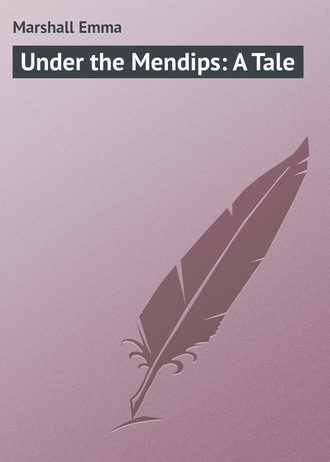
Marshall Emma
Under the Mendips: A Tale
CHAPTER V.
SUNDAY AT FAIR ACRES
The boys, perhaps excepting Ralph and Piers, were invariably more turbulent on Sunday than any other day of the week. There was an attempt made by their mother to enforce discipline on Sunday, from the same reason which made her scrupulous in attending church regularly. Besides, the boys' best Sunday jackets and long tight trousers were in peril, if their usual habits of tree-climbing and birds' egg hunting were not laid aside with their week-day garments.
The large Sunday dinner at one o'clock was always lengthened out to its utmost limit, but when that was over, the time hung heavy on hand.
A smart box on Bunny's ear, administered by Melville, with a hand on which a huge ring glistened, and which left a pretty deep triangular cut on the boy's ear, roused Piers' indignation.
"You coward," he said; "just because he trod on your smart shoe. I would not wear such a shoe for a hundred pounds."
"You are not very likely to be tried," was Melville's rejoinder. "Your feet are not made for shoes with buckles."
"Oh! Melville," Joyce exclaimed, "how can you be so unkind?" while his father said, in a stern voice, "If you have no brains, sir, I always thought you had a heart."
Mrs. Falconer was rising to follow Bunny, whose loud crying was heard in the hall; but Joyce said:
"Mother, let me go. I had better take all the boys away, mother, and amuse them, if I can. I don't think Bunny need cry like that, though it was too bad to hit him."
"It was indeed," Gilbert Arundel could not help exclaiming fervently, though like all guests in a house, when family disputes are going on, he felt it difficult to know whether to speak or be silent.
"I hate Melville," Piers said fiercely, as he swung himself out of the room after his sister.
Joyce soon persuaded Bunny that he was not much hurt, and said if they would all come up to the seat under the fir-tree she would read to them. The boys willingly consented, and Joyce ran upstairs and fetched the pretty Bible, bound in purple, with its gilt leaves, which she displayed to her admiring brothers.
"But you are not going to read that, Joyce," Piers said. "Isn't it dull? Can't you find the Pilgrim's Progress?"
"Yes," exclaimed Harry; "I like the Giant Despair part, and the history of all the bones and skulls lying about."
"I will read about a giant," Joyce said, "a very pretty story from the Bible."
"Oh! I know," said Ralph; "very well, I don't mind hearing it again."
Joyce seated herself with her brothers round her, and read the familiar Bible story, with a somewhat slow utterance, but with so much dramatic power in the tones of her voice that her listeners were profoundly attentive. Then she talked to them about David, and said she had read that the story was a type of the great battle we had all to fight against the giant of self. She did not know that she had another listener till her brothers had dispersed, and she was left on the seat with the Bible in her hand. Then Mr. Arundel came through the little gate leading from the copse, and looking up at Joyce, said:
"May I come nearer?"
Joyce started to her feet.
"Take care," she said; "the grass is very dry and slippery;" and as Gilbert Arundel made a rather scrambling ascent, Joyce advanced and held out her hand to him to help him up the last few yards.
"I have been in hiding behind that tree by the gate," he said; "I did not like to disturb the boys by my presence, after the pains you had taken to keep them quiet."
Joyce's colour rose, and she said:
"I would rather you had let me know you were listening, especially when I was talking to the boys."
"Do not be vexed with me," Mr. Arundel said. "I am so glad to have found you here alone."
"I wanted to speak to you, too," she said, quickly, "about my brother; he is" – she stopped, and then went on; "I think I may say it to you – he is the one cloud over our happy life here at Fair Acres. It used not to be so; he was very different once."
"Yes," Mr. Arundel said, "I can quite imagine it was so. Your brother is very weak of purpose, and he got into a bad set at the university where I found him."
"What made you care for him?" Joyce said, simply; "you are so different from him."
"Well, the story is rather a long one, and I do not know that all of it is fit for your ears, or that I ought to inflict it upon you. Still I think you should know something about it. I feel an interest in poor Melville much the same interest which a man takes in anything that has cost him some trouble."
"What made you take any trouble about him?" Joyce asked.
"I scarcely know; pity, I think, began it; and who could help pitying him? He got into the hands of an unprincipled man, much older than himself, who is, in fact, a relative of mine, and I did what I could to get him out of his clutches. He got all his money out of him, and then persuaded him to gamble to get more; of course ending in losing it."
"How dreadful!" Joyce exclaimed. "Does father know?"
"He knows about the money part, of course; about the debts and difficulties."
"Yes," Joyce exclaimed, with a sigh, "and it has troubled him greatly."
"What I wanted to say to you was, that I think if Melville went abroad, as he wishes, it might be a good thing, provided a safe companion could be found for him."
"Will you go?" Joyce said, eagerly.
"No, it is impossible; I could not leave my mother: I am all she has in the world. We are going to live in Bristol, where I am to be articled to a good firm of lawyers, and perhaps I may study afterwards for the bar."
"I thought you were of high family," Joyce said innocently.
"Would that prevent my taking to law?" Gilbert asked, with a smile.
"No; I don't know exactly why it should do so," she said. "Melville talks so much about things which are right for a gentleman to do, and things which a gentleman cannot do; and then he dresses so fashionably, and people remark upon it."
"I don't wonder," Gilbert said, laughing; "but that part of his proceedings is only laughable. Many men are fops in their youth who tone down wonderfully when they get old. Let us hope it will be so with him."
"You know," Joyce said, "that Melville ought to spare father expenses instead of adding to them. There have been two bad harvests and hard winters, and Mr. Watson, the steward, is getting rather past his work. Melville ought to take that place now, and save father, for there is Ralph to be educated, and he ought to have the best, for he is so studious; and then there are the three other boys, and poor Piers is lame, and they all want something."
"You don't seem to want anything yourself," Mr. Arundel said.
"No: I have a happy home and everything is beautiful about me. What can I want?"
"Not to go to London, or Bath, or to see the world?" he asked.
"I think," said Joyce, simply, "if it came in my way – I mean if there was plenty of money – I should like to travel a little. Can you believe that I have only been to Bath once and to Bristol twice in my life? and I am nearly eighteen. My Cousin Charlotte, who lives at Wells with my aunt, has been to school in Bath, but father never wished me to go to school, so I have no accomplishments. But I need not talk any more about myself, it cannot be interesting."
Gilbert Arundel was beginning a speech to the effect that what she said was most interesting to him, but somehow it died away on his lips. The sweet earnestness of the face which he had been watching while she spoke, the entire absence of self-consciousness, seemed to lift her above the level of compliments or flattery, which the gentlemen of the time considered the rightful inheritance of the young ladies, with whom they trifled for an hour's amusement.
As she sat with her face towards the beautiful landscape over which the westering sun was casting its level rays, she seemed so far above him and bearing the "lily in her hand" of which a poet of later days than those in which Joyce lived has said that —
"Gates of brass cannot withstand
One touch of that enchanted wand."
The silence which fell over Gilbert was unbroken for a few minutes by any word on either side. At last Joyce said:
"Is there anything I can do for Melville? He has rather a way of looking down on me, and I think I speak crossly to him sometimes. I wish you would tell me if you think I could help father about him."
"If he does not listen to you I should think it hopeless that he would listen to anyone," Gilbert said; "he has a way of looking down on most people."
"Not on you?" Joyce said, with a little innocent laugh. "He made us think you were very grand and that we must alter all our ways to suit you; poor mother was to change the hours for meals, and – "
"I never heard such nonsense," Gilbert said; "but I know where he got those notions from, and I may tell you this much, that the kindest thing you can do is to ask your father, to consent to his going abroad for a year as soon as may be; he will be out of harm's way. I have had some fears that the person who had such an evil influence over him might follow him here, and I was determined to circumvent him."
"It was very kind of you to take this trouble. Who is the person?"
"He is a step-uncle of mine; my mother's half-brother, Lord Maythorne."
"Quite a grand person, then?" Joyce said.
"Grand in his own eyes; yes, undoubtedly; but there is every hope that, having got what he can out of Melville, he will leave him alone. You do not know how ashamed I am to own him as a relation; and I am anxious to do all I can to atone for the mischief he may have done your brother."
"Was he at Oxford with Melville?"
"No: but, unhappily, he has a small place near Oxford, and was continually coming in."
"Shall I tell father all about what you have told me?"
"I have told him already a good deal. What I want you to do is to use every effort to persuade your father to let Melville start soon."
"It would be far better if I could persuade Melville to stay here, and learn about farming."
"Yes; but that, I am afraid, you will never do; and considering that your father wished him to work on the estate it was a mistake to send him to Oxford at all."
"Oh, yes; but it was mother's wish, you know," Joyce said, with a heightened colour. "Mother always feels that her family was not considered as good as father's; they were simple, homely, good people, but not what are called gentry, and I think it has always been mother's desire that Melville should have exactly the same advantages as the sons of our neighbours. Charlie Paget went to Oxford; they live at Ebbor Court; and so it seemed her eldest son ought to go. It is so strange that mother should be quite consistent on every subject but one, and that one, the indulgence of Melville; and now I believe he will break her heart."
"No, no, I trust not so bad as that," Mr. Arundel said. "I have hopes that there will be a change for the better, and all this folly and aping his betters will drop off like an old cloak one day."
Joyce sighed.
"I wish I could have hopes too; there is always, I suppose, some cloud in everyone's sky; and we are so happy, that if it were not for Melville, we should have all we wished for. Yesterday in the hay-field I felt as if even to be alive was delicious, everything was so bright and joyful. Then Mrs. Hannah More came and invited me to Barley Wood. Have you heard of Mrs. More?"
"Yes, I think I have. A very good old lady, who has set up schools for the poor children. My mother knows all about her. Will you like going to Barley Hill?"
"Barley Wood," Joyce corrected. "Yes, I think I shall. Charlotte is to come also; and I dare say I shall like it when I am there, and it may do me good. You know Aunt Letitia always calls me 'a little rustic.' Of course I am, but I do not know that it is of such great consequence as Aunt Letitia thinks."
"It would be a pity, indeed, if you were anything but what you are," Gilbert said earnestly. "A change could hardly be an improvement."
"Oh, do not say that," Joyce said. "I want to know more, and though I read everything I can in father's library, I do not get any new books. Ralph helps me with Latin, and Piers and I learn French together, though I expect our pronunciation would make you laugh. We have just read Madame de Stael's 'Corinne' and a story called 'Matilde,' which Charlotte lent me. Is not Piers wonderful?" she asked; "he is so happy, and have you seen his collection of moths and butterflies? You must come into his room and see them."
"Yes, I should like to do so very much, if you will be showwoman."
He liked to hear her talk of her simple home pleasures and interests; he liked to watch the ever-changing expression of her lovely face; he felt within himself that this hour on the hill-side, was to remain a bright memory with him for many a day, to which he would recur with pleasure, and over which no cloud could come.
At last the sound of the boys' voices in the copse below, roused them both from their earnest talk, and Joyce's name rang through the still summer air —
"Joyce! Joyce! tea has been ready ever so long. Mother does not like waiting. Do come!"
"Yes, pray come, Joyce; there is no one to pour out tea, or cut the cake. Mother says you ought not to have put sugar on the cake," said Bunny. "I am so glad you did."
Joyce flew swiftly down through the wood, and by the time Mr. Arundel and her brothers had reached the house, she was at her post behind the large bronze urn, and taking up her accustomed duties with a face so bright and winning, that her mother forgot her vexation, merely saying:
"I like punctuality at meals, Joyce, especially on Sunday; for it puts the servants out if they are driven."
"Why, my Sunshine," her father said, "where have you been hiding? We thought you were lost."
"Joyce has been sitting under the fir-tree with Mr. Arundel," shouted Bunny in his ringing, boyish treble. "They have been there two hours."
Bunny was in advance of the other boys and their guest; and it was Piers who said: "You need not shout as if you were the town-crier!" While Melville dragged himself out of the depths of a large sofa covered with horse-hair, where he had been sleeping off the effects of his large dinner and repeated glasses of ale and wine, and said the boys' voices were a perfect nuisance, and he did not know what Arundel thought of such a hubbub.
A laugh from the person in question, as he passed the open window with Ralph, seemed to point to the fact that Gilbert had as light a heart as any of the young brothers at whom Melville so often took offence.
Family prayers were the exception in many households in these days; but as there was only one service in the church on Sundays, the squire, following his father's custom before him, always assembled the household in the evening, and read a chapter from the old family Bible, and a short dry sermon with a prayer from an old book, in which was written his mother's name. It might be questioned whether the rosy-cheeked maiden and the stalwart young men from the Farm, who sat with their hands one on each knee, staring at Melville and the visitor, as strange specimens of humanity, could understand a word of the sermon or follow the prayer.
Perhaps Joyce scarcely realised how dry and formal this service was, and yet this evening a new spirit seemed to be stirring within her, an aspiration for something, she hardly knew what, but something which was not outside of her, but touched her inmost heart.
Her mood was subdued and quiet during the rest of the evening, and when she knocked at Piers' door to be admitted, as was her invariable custom, to make his room tidy, and place his crutches near the bed, the boy said:
"Do you like Mr. Arundel, Joyce?"
"Yes, dear; I think I like him very much."
Piers was silent.
"The next thing will be that you like him better than me."
"Nonsense, Piers; is that likely?"
Joyce had finished her labours in the little room now, and had seated herself in the window-seat looking out into the grounds.
The moon, nearly at the full, was lifting her round, white face above the low-lying range of hills eastward while the colour of the sunset sky still lingered in the west.
The window was open, and from below Joyce heard the sound of her father's voice and Mr. Arundel's. She knew what they were talking about, and she said:
"Of course I like Mr. Arundel, who is so good about Melville, and came here solely to try to be of use to him: very few people would have taken that trouble."
Piers gave a low rejoinder, which might be taken for consent.
"He says, Piers, a man he knows has a bad influence over Melville, and that he is a relation of his, and that he thinks Melville ought to be sent abroad."
"To do just what he likes, as he always does," was Piers' rejoinder. "It is a shame that Melville should bring so much trouble on us."
"Yes, it does seem a shame," Joyce said; and then she went to the bed, and, kneeling down, kissed Piers' hand as it lay upon the counterpane.
"I felt so sorry for you this afternoon, dear," she said. "It gave me a great pain to hear Melville speak as he did to you."
"Never mind, Joy, never mind. What does it matter?" And the boy stroked his sister's hair fondly. "I don't mind; I would rather have my crooked, helpless legs than be like him. Yes, I really would," he repeated. "But Joyce, don't begin to care for any one more than me; that is what I dread."
"You foolish boy," she answered; "as if I could care for any one as I do for you! And when I come back from Mrs. More's I shall have so much to tell you; and I may get some nice books there, which we will read together."
Piers turned suddenly and threw his arms round his sister's neck. He was not usually demonstrative, but he said, with passionate energy, "While I have you, Joy, I can bear anything. Good-night."
"Good-night, dear; and never take foolish fancies into your head. You may be sure I shall always love you and be all I can to you. Good-night."
There is no doubt that a protecting maternal element in the love of a sister for a brother makes the tie one of the most beautiful that exists. From the time of Piers' accident Joyce had constituted herself his helper and friend. Mrs. Falconer in her busy life could not devote herself to her crippled boy, as mothers of a less energetic and active nature might have done.
Joyce and she had it is true one aim in common: to hide from the father the sad consequences of that one rash act which had shut Piers out for ever from the free, joyous life of his young vigorous brothers. Mrs. Falconer did this by apparently making light of her boy's ailments, and inability to do what others did.
It was a good thing, she would say, that he could not climb trees and tear his clothes, or get into the stream by Wookey and ruin his boots and socks, or make her anxious by carrying a gun behind his father, in the time of rabbit and rook shooting.
Mrs. Falconer never betrayed what was indeed the truth, that the sound of Piers' crutches as they tapped across the old stone pavement of the hall, sent a thrill of sorrow through her breast, and that when Piers was laid up, as was not unfrequently the case, with an attack of pain in the hip which had been so severely injured, she avoided being much with him, and left him to Joyce, because the sight of his suffering brought back the memory of that morning when she saw him clinging with a frightened face to Rioter's back, and heard her husband say, "Don't make a coward of the boy: his brothers rode long before his age."
She knew too well how bitter had been her husband's self-reproaches, and she dreaded adding to them by any impulsive, unguarded word of her own.
Thus it was that Joyce was sister, mother, and friend to her lame brother. Their lives were bound up together, and the bond strengthened as time went on.
It was sufficient reward for Joyce to know that, however irritable when in pain, or depressed sometimes by a sudden reminder of his helplessness when contrasted with his brother's independence and vigour, she could always be sufficient to charm away the cloud by her own sunny brightness, and that by making his interests hers, she never let him think she did anything for him, which was not a real pleasure to herself.
The secret of heart service lies in this, that those who are served never know it to its full extent, and that any effort that may be made, or any trouble that may be taken, is so hidden under the mantle of all-pervading love that it is often wholly unsuspected. When the giver is as happy as the receiver, the gift, in whatever form, is sweetened and enhanced a hundred fold.






